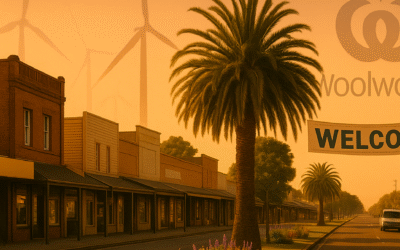When a supermarket chain arrives in a small town, the story is never just about groceries.
For the first few years after Woolworths opened in one regional town, sponsorships flowed. Sports clubs received cheques, school fetes had backing, and sausage sizzles came with bread and barbecues supplied at cost. The company played the role of community benefactor. But when that budget dried up, the goodwill dried up too. The sizzles became gift cards, and over time even those became rarer. Locals kept shopping – because prices mattered – but the muttering grew. Woolworths was no longer a partner, but an opportunist.
This is the dilemma of regional investment. Every project, whether a supermarket, a wind farm, or a new tourism venture, arrives with a promise. Jobs, infrastructure, services. But the promise is always weighed against a deeper, quieter question: is this company here for us or for itself?
The false signals of demand
Scroll through a town’s Facebook Buy Swap and Sell page and you’ll see it: endless threads about what shops or services the town “needs.” Aldi. McDonald’s. Beauticians. Wine bars. Every suggestion is met with applause. The same thing happens with activities: pilates, kendo, pole dancing, Russian swordfighting. Yes, brilliant! Just what we need.
Then reality hits. The shop opens, and people keep buying their groceries or books online. The class runs for a month, then fizzles. The enthusiasm was genuine, but it was enthusiasm for the idea of choice, not the practice of sustaining it. Outsiders see these threads and mistake them for market signals. But in small towns, desire and behaviour don’t always align.
That gap between what people say they want and what they actually support is where opportunism often creeps in. Businesses mistake noise for need, mistaking a wishlist for a customer base.
Reciprocity as the test
Peter Drucker argued that management is a social function, not just an economic one. Legitimacy comes when an institution contributes to the community that sustains it. Regional investment lives or dies on this principle.
Southerly Ten’s approach in Gippsland is one example. They opened an office in Yarram years before they had approvals. They hired locally, showed up at community meetings, created advisory groups, and used local vessels for surveys. By the time their project gained momentum, they had demonstrated reciprocity. They gave before they took.
Contrast that with Bendigo Bank. For years it earned trust as the “people’s bank,” a rare institution that promised to stay when others left. Locals believed it. Then came the closures. Even if the economics were defensible at head office, the cultural betrayal was sharper than anything the Big Four could manage. Those banks had never claimed to belong. Bendigo had.
The difference is reciprocity. Woolworths stopped giving, Bendigo stopped staying. Southerly Ten kept listening. Reciprocity is the quiet ledger locals keep in their heads, and it is merciless.
The turbulence clash
Igor Ansoff’s turbulence theory helps explain why missteps are common. Corporates are turbulence-trained: they expect rapid change, shifting conditions, fast adaptation. Small towns are stability-trained: their rhythms are seasonal and generational.
A new venture arrives with the urgency of quarterly targets. The town measures it against decades of memory. When the pace doesn’t match, suspicion follows.
How not to be the money train
So how does a business avoid being seen as opportunistic?
- Show up early. Belonging requires presence before profit.
- Give more than money. Cheques matter, but trust is built by people showing up, not logos on banners.
- Match the rhythm. Respect the slower tempo of local life. Patience is read as sincerity.
- Make reciprocity visible. Use local suppliers, hire locally, participate in community rituals.
In other words, cultural due diligence is as important as financial due diligence.
Regional investment is not just an economic act. It is a cultural negotiation. Communities don’t just weigh jobs and services; they weigh intention. Is this company here to be part of the town’s story, or is it just passing through on the money train?
The answer often decides whether an investment thrives, struggles, or leaves behind nothing but resentment.
Lessons From the Country Store: What Big Retail Forgot About Trust
Small country towns show how trust, reciprocity, and human scale create a stronger retail model. This article explains why Gen Z aligns with country retail and what big brands can learn.
Urban Refugees: When City Migrants Rewrite Country Life
City migrants bring renewal to small towns but also risk reshaping them in ways that erode what made them attractive. This article explores the café paradox, the culture clash, and why belonging is earned, not claimed.
Why Big Business Struggles to Belong in Small Towns
When big business arrives in a small town, success isn’t measured only in sales. Southerly Ten’s patience in Gippsland shows how trust can be earned, while Woolworths and Bendigo Bank reveal how quickly it can be lost. Small towns measure belonging not in quarters, but in decades. This article explores why culture, memory, and legitimacy matter more than profit when corporates cross the town gate.






